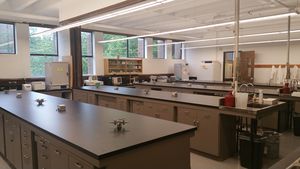FNH Teaching Lab

DO NOT attend labs if you are sick - you can contact your instructor to make alternative arrangements.


FNH Teaching Lab is located in rooms 220 - 240 at the H.R. MacMillan Building. The teaching lab currently hosts lab courses APBI 327 (Thursday 9 - 11 am and 1:30 - 3:30 pm), FNH 325 (Tuesday 1 - 5 pm), FNH 425 (Monday 1 - 5 pm), FOOD 521 in term 1, and FNH 326 (Tuesday 1 - 5 pm), FNH 425 (Monday 1 - 5 pm), FOOD 520 in term 2. The FNH teaching lab contains 3 major rooms: MCML 220 contains mainly 3 lab benches that can comfortably accommodate 10 - 12 students (max: 24 students); MCML 230 has 5 lab benches that can fit around 20 - 24 students (max: 40 students); and MCML 240 contains 4 lab benches that can accommodate 24 - 30 students (max: 40 students).
Aside from the bench space, the teaching lab also features many instruments such as autoclave, BUCHI digestion and distillation system, Agilent 5800 Inductively Coupled Plasma Optical Emission Spectroscopy (ICP-OES), Aqualab water activity meter, Agera Hunterlab colorimeter, incubator shaker, pH meters, water baths, ovens, incubators, Labconco Goldfisch fat extraction apparatus, Tecan Spark Spectrophotometer, muffle furnace, rotary evaporator, portable induction cooktop, centrifuge, microcentrifuge, stomacher, vacuum pumps, heat and stir plates, vortex, vacuum oven dryer, viscometer, microscopes, etc.
QReserve
Instruments in the FNH Teaching Lab can be reserved online via QReserve. User will need to set up an account with an email address, or connect via "Sign in with Partner," select "University of British Columbia" and log in with UBC Campus Wide Login. Access to FNH Teaching Lab in QReserve is either done via a "Join code" provided by the course instructor or FNH Technician, or by request by email. User can book the available instrument on the webpage, or scan the QR code on each instrument to access the reservation calendar to book the specific instrument. Some portable items can possibly be loaned out temporarily by submitting the online Equipment Loan Form. For more details, please contact the FNH Technician at [[Mailto: Imelda.Cheung@ubc.ca|Imelda.Cheung@ubc.ca]].
Standard Operating Procedures (SOPs)
The standard operating procedures (SOPs) for each instrument have been posted near the instrument for review and quick guidance. However, to use any instrument at the FNH teaching lab, it is mandatory for users to attend an in person training with the FNH technician. Training session can be scheduled by email to [[Mailto: Imelda.Cheung@ubc.ca|Imelda.Cheung@ubc.ca]].
The general rundown of the training includes the following:
- User must complete the site specific safety orientation at the FNH teaching lab.
- User must review the written SOP provided by the FNH technician, or review the youtube video if available.
- User must attend an in person session demonstrated by the FNH technician.
- User must operate the instrument independently while witnessed by the FNH technician.
Training of the instruments at the FNH Teaching Lab is strictly enforced in order to ensure proper functioning of the instruments. Peer to peer teaching is NOT recommended and recognized unless otherwise approved by the FNH technician or course instructor. These rules are set to reduce misuse of the instrument, thereby reducing financial burden at the FNH teaching lab relating to instrument damage or repair.
Several common experimental procedures, sample calculations, statistical analysis and/or equipment SOPs have been prepared as demonstrations in videos by our Teaching and Learning Enhancement Fund (TLEF) projects. Students, teaching assistants and researchers are highly encouraged to review the use of instruments and experimental protocols using these demonstrative videos.
Quartzy
The FNH Teaching Lab adopts an online inventory system to keep track of chemicals, supplies and other resources available. Users can sign up an account on Quartzy to gain access to the database and check conveniently whether specific chemicals/supplies are available, then further inquire whether they can be provided by the FNH Teaching Lab. FNH Teaching Lab strongly encourages the sharing of chemicals/supplies/resources to reduce large volume of hazardous and non-environmental friendly wastes. Furthermore, users can use the order module in the database to request for reagents and supplies, or select items in the inventory to re-order, as long as a valid speed chart or program code is provided. Safety data sheets to each chemical are also available as attachment in Quartzy to adhere to WorkSafe BC guidelines. Users are highly recommended to review the safety data sheets prior to using any chemicals.
Laboratory Safety and Etiquette
Safety is of utmost important in a laboratory environment and it is no different in the FNH Teaching Lab. Each user who will work independently in the FNH Teaching Lab will be required to take the Chemical safety training course offered by UBC Safety & Risk Services. The user is also strongly encouraged to take the Mandatory Training for all workers including New Worker Safety Orientation, Preventing and Addressing Workplace Bullying and Harrassment Training, and Workplace Violence Prevention Training. A specific lab safety orientation (video on YouTube and in person walk-through) will be provided to introduce the safety features at the FNH Teaching Lab as well as any particular rules that need to be obeyed when working in the FNH Teaching Lab. Users are strongly encouraged to also review the Lab Etiquette and Lab Safety as well as the Lab Golden Rules before beginning work at the FNH Teaching Lab.